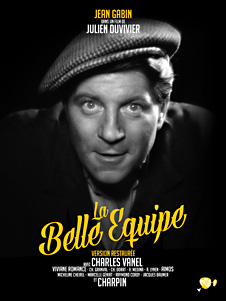THEY WERE FIVE / La Belle équipe
North American Premiere (Restored) • Comedy/Drama • France, 1936
DCP • 1.37 • Mono • Black & White • 101 min
Directed by: Julien Duvivier
Written by: Charles Spaak, Julien Duvivier
Cinematography: Marc Fossard, Jules Kruger
Film Editing: Marthe Poncin
Original Score: Maurice Yvain
Produced by: Arys Nissotti (Ciné-Arys)
Cast: Jean Gabin (Jean dit Jeannot), Charles Vanel (Charles dit Charlot), Raymond Aimos (Raymond dit Tintin), Viviane Romance (Gina)
International Sales: Pathe international • patheinternational.com
Jean Gabin and Charles Vanel headline this cautionary tale of five working-class Joes whose friendship is torn apart after they unexpectedly win the lottery. Jeannot (Gabin) convinces the others to pool their windfall and repair to the banks of the river Marne, there to transform an old ruin into a guinguette (open-air café), to be owned and operated collectively. Their metaphorical utopian community begins to collapse as defections and misfortunes gradually dwindled their numbers and their morale. Until finally, the intrusion of conniving uber-vixen Gina crushes the last vestiges of fraternal solidarity. The film’s cheerful, idyllic set-up serves to make the final, pessimistic gut punches land all the more effectively. Considered a masterwork of Julien Duvivier, a more prolific but lesser known contemporary of Jean Renoir, COLCOA is pleased to present the North American Premiere of the restored version, with its rarely seen original ending.
In 1936 much of France was swept up in the enthusiasm for leftist politics culminating in the election of the socialist Front Populaire. Not everyone was so smitten with the ideology, however, and two of its skeptics were screenwriter Charles Spaak and writer/director Julien Duvivier. They set out to make a film that mocked what they saw as the hopeless naiveté of the left. The result was a film so completely out of step with the mood of the times that after a short, disastrous theatrical run, producer Arys Nissotti convinced Duvivier to shoot a more optimistic ending. The new cut sat better with audiences at the time, but today feels disjointed since the ending contradicts everything that came before it. Thought to be lost, a copy of the film with the original version of the final reel was recently unearthed in the Cineteca Nazionale in Rome. Known as a “Poet of the Real”, Duvivier made 67 films, among which are a score of unsung masterpieces. He is perhaps best known for Pépé le Moko (1937) one of his many collaborations with Jean Gabin.
QUOTES:
“…among Julien Duvivier's most sarcastic and most frighteningly prescient.”
– James Travers, Films De France
“…one of [French Cinema’s] master directors, albeit one whose full measure has yet to be taken.
– Scott Foundas, Village Voice





